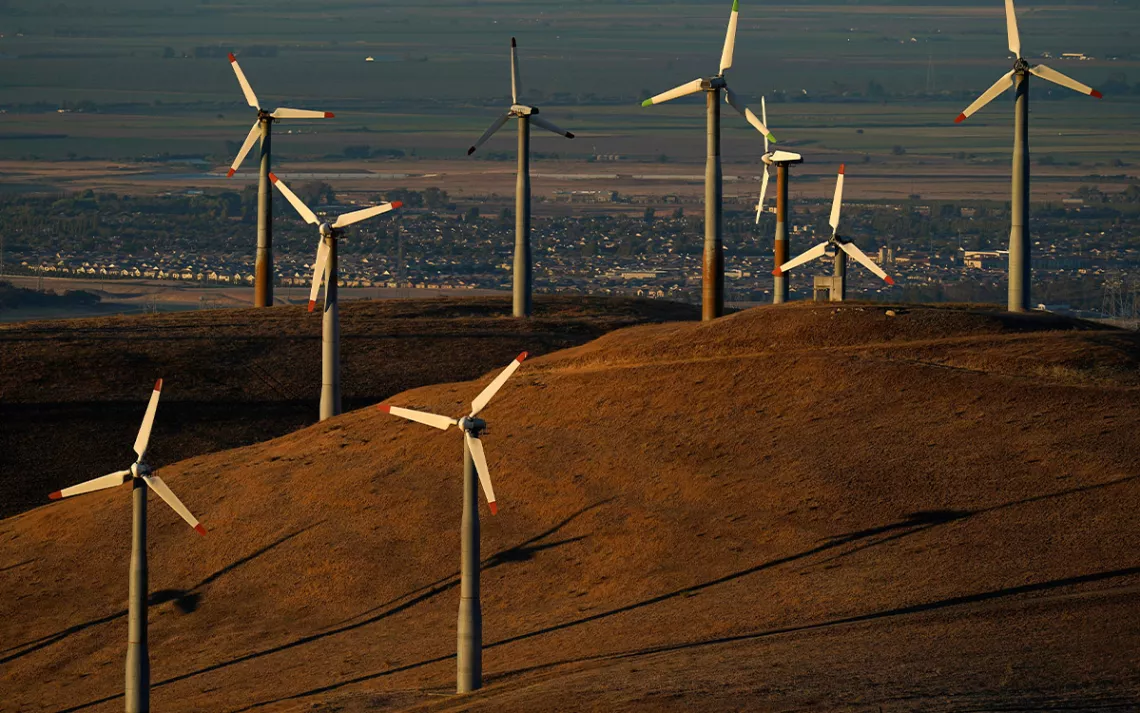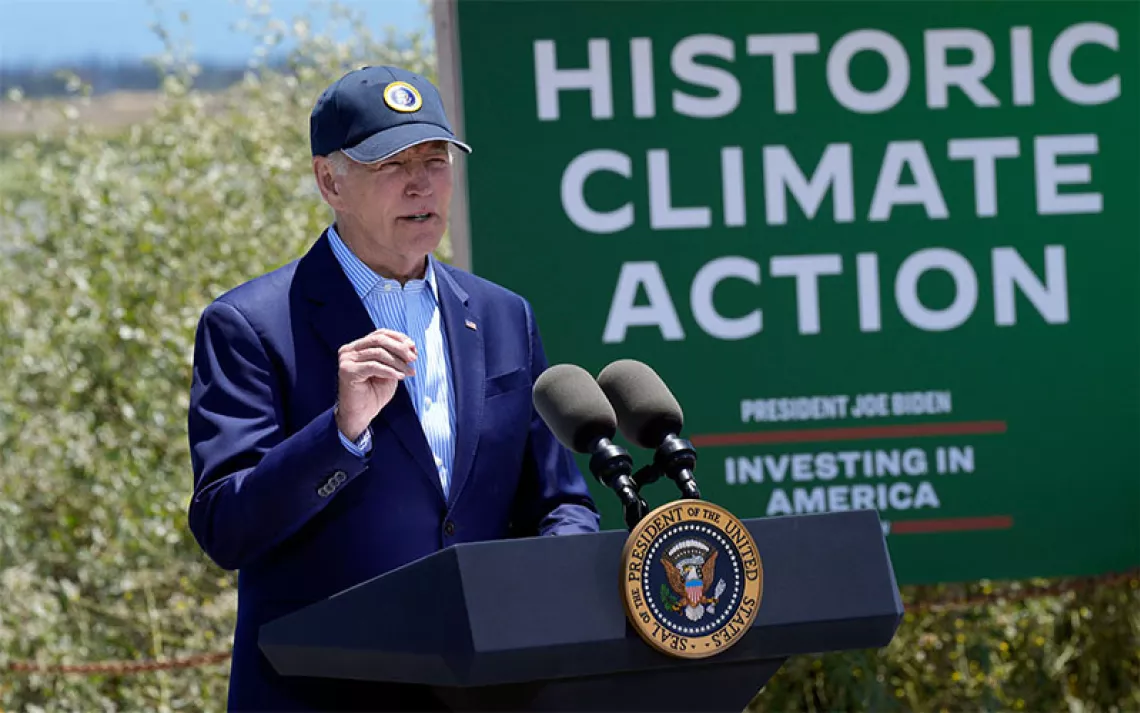Why One of the Nation’s Most Crucial Environmental Laws Is Being Modernized
Environmental groups are cautiously optimistic about new NEPA rules

Wind turbines in Livermore, California. | Photo by Godofredo A. Vásquez, AP File
The Biden administration is attempting to modernize one of the country's most crucial environmental laws following months of congressional sparring over how to best bring it into the 21st century. If the draft regulations are finalized, dozens of new provisions would amend the National Environmental Policy Act, a law that, among other things, affects the government's ability to scale up major infrastructure projects ranging from solar farms and wind turbines to electricity-transmission lines and highways.
The changes, first proposed at the end of July, have garnered mixed responses from legislators and conservationists, with House Republicans deriding the proposal’s perceived favoritism toward renewable energy projects. Environmental groups and most Democrats counter by saying that the new measures will allow federal agencies to include frontline communities early in the planning phase for new federal projects and make the environmental review process easier to follow.
“We are encouraged that the Biden administration has taken this step toward ensuring certainty and transparency in the NEPA process,” Ben Jealous, the Sierra Club’s executive director, said when the draft rules were released in July. “We urge them to act quickly to finalize the strongest rule possible to build a just clean energy future.”
Groups such as the Wilderness Society have also welcomed provisions that require agencies to include tribes as joint leads on projects and to utilize Indigenous knowledge where it’s applicable. For the first time, climate change and environmental justice would be referenced in NEPA, which would require federal agencies to analyze climate effects in its impact statements and would direct staff to identify the least harmful alternatives to projects in frontline communities.
Some of the new updates reverse Trump administration rollbacks that were put in place in 2020. Others codify guidance issued by the White House Council on Environmental Quality (CEQ) back in April. The debt ceiling bill, signed into law in June, also mandated additional provisions sought by Republicans.
Under the newly proposed rules, frontline communities could comment on environmental assessments earlier. Federal agencies would be able to use a single analysis for environmental reviews, thus streamlining the process. And each agency involved in the NEPA review process would be required to hire a chief public engagement officer.
“NEPA is the sole reason that communities can actually access information on the effects of these federal infrastructure projects on their health and safety,” Mahyar Sorour, director of the Sierra Club’s Beyond Fossil Fuels Policy, said. “Having set folks who actually reach out to communities early in the project process so that folks can weigh in and share their concerns, we believe, is critical.”
The process of updating NEPA’s regulations started early in the Biden administration. During his first month in office, the president vowed to rescind the previous administration's regulations that limited communities' ability to challenge projects in court, such as one that added new requirements for raising concerns during the comment process. Last year, CEQ, which oversees the implementation of NEPA, released phase one of the rules, which erased much of what the previous administration had done. Among those updates were provisions that require agencies to consider all impacts—direct, indirect, and cumulative—of a proposed project. The agency also affirmed that its environmental regulations are floors, not ceilings. CEQ was poised to release phase two of its rules in January, but congressional wrangling over how to update NEPA hampered that effort.
Republicans and Senator Joe Manchin, the West Virginia Democrat, have long sought to limit the scope of NEPA under the guise of what they call “permitting reform.” The issue reached a head last spring when many pro-oil legislators withheld their votes on a bill that was intended to avert a funding crisis. Meanwhile, President Biden and some Democrats have wanted to streamline the review process for renewable projects while keeping provisions that protect people and the environment.
"What we've been focused on, as we start to dig into the proposal, is sort of thinking about how this helps us realize our vision for public lands, and the essential role that public lands play in addressing and solving the biodiversity and climate crises," Ronni Flannery, a senior staff attorney with the Wilderness Society, said. "And we think it does a pretty good job so far with some caveats."
Among those concerns are provisions Republican leaders crammed into the must-pass spending bill, such as those that set timeframes for critical reviews that agencies use to outline the environmental impacts of proposed projects. For environmental impact statements, which often include several alternatives an agency might take, agencies would have to complete their studies within two years. The review would have to be completed within one year for environmental assessments, which are less involved and typically only describe the impact of one proposal.
Another concern that environmental groups have brought up is the mandated page limits for federal evaluations. This was ostensibly added to make it easier for the public to read through the official documents, but some groups fear this could prevent agency staff from including valuable information related to the impacts of a proposed project.
"I think for us, when there are massive and complex projects, like LNG export facilities, or massive oil or gas pipelines, we don't want folks to be constrained to a certain amount of page limits for their environment review," Sorour added. "It should take the amount of time to do the review to make sure you're looking at all the possible key pieces of that project."
To help raise public awareness of this important process, the White House Council on Environmental Quality has hosted a series of public meetings during which citizens were invited to share their comments on the proposed rules. For their part, conservation groups, including the Sierra Club, are asking their members to weigh in on the draft rules before the September 29 public comment deadline, hoping that they will call on the agency to support the measures that include tribes and frontline communities while opposing the timelines and page restrictions.
"NEPA is basically a transparency and good governance statute," Nathaniel Shoaff, a senior attorney with the Sierra Club, said. "If you care about climate impacts, if you care about public health impacts or impacts to air or water, the very best place to find out what those impacts are going to be is through the NEPA process."
 The Magazine of The Sierra Club
The Magazine of The Sierra Club







